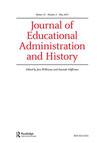Ecological materialism: redescribing educational leadership through Actor-Network Theory
IF 1.6
Q2 EDUCATION & EDUCATIONAL RESEARCH
Journal of Educational Administration and History
Pub Date : 2023-09-14
DOI:10.1080/00220620.2023.2258343
引用次数: 0
Abstract
ABSTRACTIn the latest two decades, there has been an increasing number of publications in education studies drawing on Actor-Network Theory (ANT). However, the uptake of ANT in education studies was not immediate, and the investigations on educational leadership through ANT have been rare. With the aim of promoting the study of educational leadership through ANT, this article shows that ANT is a vocabulary to counter modernistic thinking in education and brings ecological materialism to critical educational leadership studies. While modernity inscribes educational leadership in binary (mind vs body; people vs things; human vs machine) and humanist thinking (humans above things), ANT invites to see it as a more-than-human activity of (re)assemblage of people, technologies, and things for the (re)composition of the common world.KEYWORDS: Actor-Network Theoryeducation studieseducational leadershipecological materialismcritical studiesmodernity Disclosure statementNo potential conflict of interest was reported by the author(s).Notes1 This article develops some arguments that have been anticipated by Landri (Citation2020)2 This is also consistent with research in organisation studies (Czarniawska and Sevon Citation1996).3 The idea of educational leadership as more-than-human activity follows parallel attempts to see for example health as more-than-human Lupton, D., Wozniak-O’Connor, V., Rose, M. and Watson A. (Citation2023).4 Here I follow Tummons’ strategy of updating Latour with Latour, but in a different way (Tummons Citation2020; Citation2021).5 An interesting philosophical work to develop a ‘things-centered pedagogy’ has been written by Vlieghe and Zamojski (Citation2019) that provides a lot of inspiration for this article.Additional informationNotes on contributorsPaolo LandriPaolo Landri is Research Director of the Institute of Research on Population and Social Policies at National Research Council in Italy (CNR-IRPPS). Recently, he has published Educational Leadership, Management, and Administration through Actor-Network Theory London: Routledge (2020) and with Denise Mifsud (2021) Enacting and Conceptualizing Educational Leadership within the Mediterranean Region. Leiden/Boston: Brill/Sense Publisher. Currently, he Co-Editor in Chief of the European Educational Research Journal (EERJ) https://journals.sagepub.com/home/eer生态唯物主义:用行动者网络理论重新描述教育领导
摘要近二十年来,运用行动者网络理论(ANT)进行教育研究的论文越来越多。然而,在教育研究中对ANT的吸收并不是立即的,通过ANT对教育领导的调查也很少。本文旨在通过ANT来促进教育领导的研究,表明ANT是一个反制现代主义教育思维的词汇,并将生态唯物主义引入批判性教育领导研究。而现代性则将教育领导力刻入二元(心灵vs身体;人vs物;人类vs机器)和人文主义思维(人高于物),ANT邀请人们将其视为一种超越人类的活动,将人、技术和事物(重新)组合在一起,以(重新)组成共同的世界。关键词:行动者网络理论教育研究教育领导生态唯物主义批判研究现代性披露声明作者未报告潜在利益冲突。注1本文发展了一些Landri (Citation2020)已经预料到的论点2,这也与组织研究(Czarniawska和Sevon Citation1996)的研究一致教育领导是一种超越人类的活动,这一观点遵循了类似的尝试,例如将健康视为超越人类的Lupton, D., wozniako 'Connor, V., Rose, M.和Watson A. (Citation2023)在这里,我遵循Tummons的策略,用Latour更新Latour,但以不同的方式(Tummons Citation2020;Citation2021) 5Vlieghe和Zamojski (Citation2019)撰写了一篇有趣的哲学著作,以发展“以事物为中心的教学法”,为本文提供了很多灵感。本文作者paolo Landri是意大利国家研究委员会(CNR-IRPPS)人口与社会政策研究所的研究主任。最近,他出版了教育领导,管理和管理通过行动者网络理论伦敦:劳特利奇(2020)和丹尼斯·米夫苏德(2021)制定和概念化地中海地区的教育领导。莱顿/波士顿:Brill/Sense Publisher。目前,他是欧洲教育研究杂志(EERJ) https://journals.sagepub.com/home/eer的主编之一
本文章由计算机程序翻译,如有差异,请以英文原文为准。
求助全文
约1分钟内获得全文
求助全文
来源期刊

Journal of Educational Administration and History
EDUCATION & EDUCATIONAL RESEARCH-
CiteScore
3.80
自引率
5.60%
发文量
25
 求助内容:
求助内容: 应助结果提醒方式:
应助结果提醒方式:


